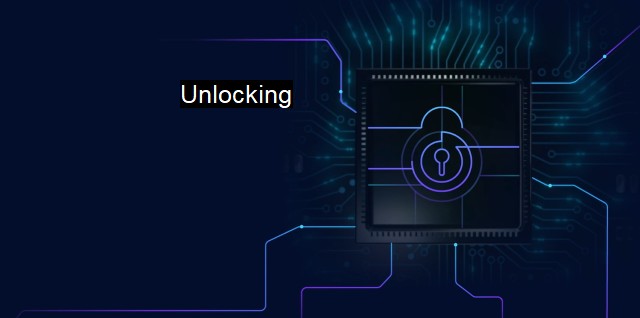What is Unlocking?
Understanding the Importance and Risks of Unlocking in Cybersecurity and Antivirus
Within the context of cyber security, the term "unlocking" describes a process that permits unauthorized access or unrestricted control of a digital device, such as computers, smartphones, or tablets. It is a contentious term heavily connected to discussions about digital rights, data protection, ethics, and the appropriate uses of digital technology.Unlocking can refer to a variety of practices, depending on the context. For instance, one might talk about unlocking a phone, removing restrictions that a service provider imposes - a practice that may imply unauthorized or controversial actions. within the world of cyber security, "unlocking" most frequently refers to the process of undoing restrictions that malware, such as ransomware, imposes on a system.
Ransomware, one of the most prevalent cybersecurity threats worldwide, restricts users' access to their digital devices until they pay a ransom, fueling a malicious market that generates billions of dollars yearly. A cybersecurity expert's goal is to unlock the system, freeing it from the ransomware's grip. The process of unlocking a system compromised by ransomware invariably involves complex tasks of identifying the malware, isolating it to stop further infection, and removing it from the system.
Diverse tools that aid this unlocking process exist, with antivirus software being the most popular. Antivirus systems scan, detect, isolate, and then remove various forms of malware, helping to unlock systems in the process. not all antivirus systems can thoroughly unlock devices infected with more sophisticated forms of ransomware. Cybersecurity firms frequently derive more specialized ransomware decryption tools from their ongoing research. These tools are specifically designed to counteract more virulent malware strains, unlocking the encrypted data and granting full system access.
While ransomware presents a clear ethical context for unlocking (given one party restricts another's data access for malicious intent), different situations might introduce various nuances into this topic. unlocking sometimes references processes where users tinkering with their device firmware to run unauthorized applications. This practicality is desirable to many but challenges conventional assumptions about usage rights, warranty validity, and legal responsibilities for the software used post-unlocking.
Unlocking is a heavily controversial subject in the industry. On one hand, consumers argue for the right to use purchased devices as they see fit, including the right to unlock them from service providers or unlock further capabilities restricted by the manufacturer. On the other hand, manufacturers and various institutions highlight cyber risks associated with unlocking devices, as doing so often necessitates security measures bypass or alters original system defenses.
Unlocking has significant implications for cyber security as a potential weak-link or an Achilles heel in the fight against cyber-criminals. The tweaking or disabling of security features could lead to the device's exposure to various security threats, including malicious software and hackers. This matter is an outstanding concern for organizations prioritizing proprietary or sensitive data protection.
The concept of unlocking within cybersecurity remains a significant research and discussion area, from both a technological and an ethical perspective. As malware threats continue to evolve, turning more sophisticated, unlocking techniques also require constant enhancement to counter rising threats. the balance between access rights and security is integral to shaping the digital landscape concerning unlocking – a challenge that demands a delicate balance.

Unlocking FAQs
What is unlocking in cybersecurity and antivirus?
Unlocking refers to the process of bypassing security measures on a device or software to gain access to restricted features or content. It is often used in cybersecurity to gain access to locked files or systems, or to remove malware that is blocking access to important features or data.Is unlocking legal in cybersecurity?
The legality of unlocking in cybersecurity depends on the specific circumstances and the laws of the country in question. In some cases, it may be legal to unlock certain types of devices or software for legitimate security or maintenance purposes, but in other cases, it may be considered illegal hacking or circumvention of security measures. It is important to consult with a qualified cybersecurity professional or legal advisor before attempting any kind of unlocking or circumvention.How can I unlock my antivirus software?
The process for unlocking antivirus software will depend on the specific software and the reason for the lock. In some cases, you may be able to unlock the software by entering a valid license key or updating to a newer version that fixes the issue. In other cases, you may need to contact the software provider or a qualified cybersecurity professional for assistance in unlocking the software.What are the risks of unlocking in cybersecurity and antivirus?
Unlocking can carry a number of risks, including introducing security vulnerabilities or malware onto your device or network, violating laws or warranties, and potentially causing damage or loss of data. It is important to carefully consider the reasons for unlocking and to seek professional advice before attempting any kind of unlocking or circumvention in a cybersecurity or antivirus context.Related Topics
Password cracking Two-factor authentication Encryption Malware removal Phishing prevention
| | A | | | B | | | C | | | D | | | E | | | F | | | G | | | H | | | I | | | J | | | K | | | L | | | M | |
| | N | | | O | | | P | | | Q | | | R | | | S | | | T | | | U | | | V | | | W | | | X | | | Y | | | Z | |
| | 1 | | | 2 | | | 3 | | | 4 | | | 7 | | | 8 | | |||||||